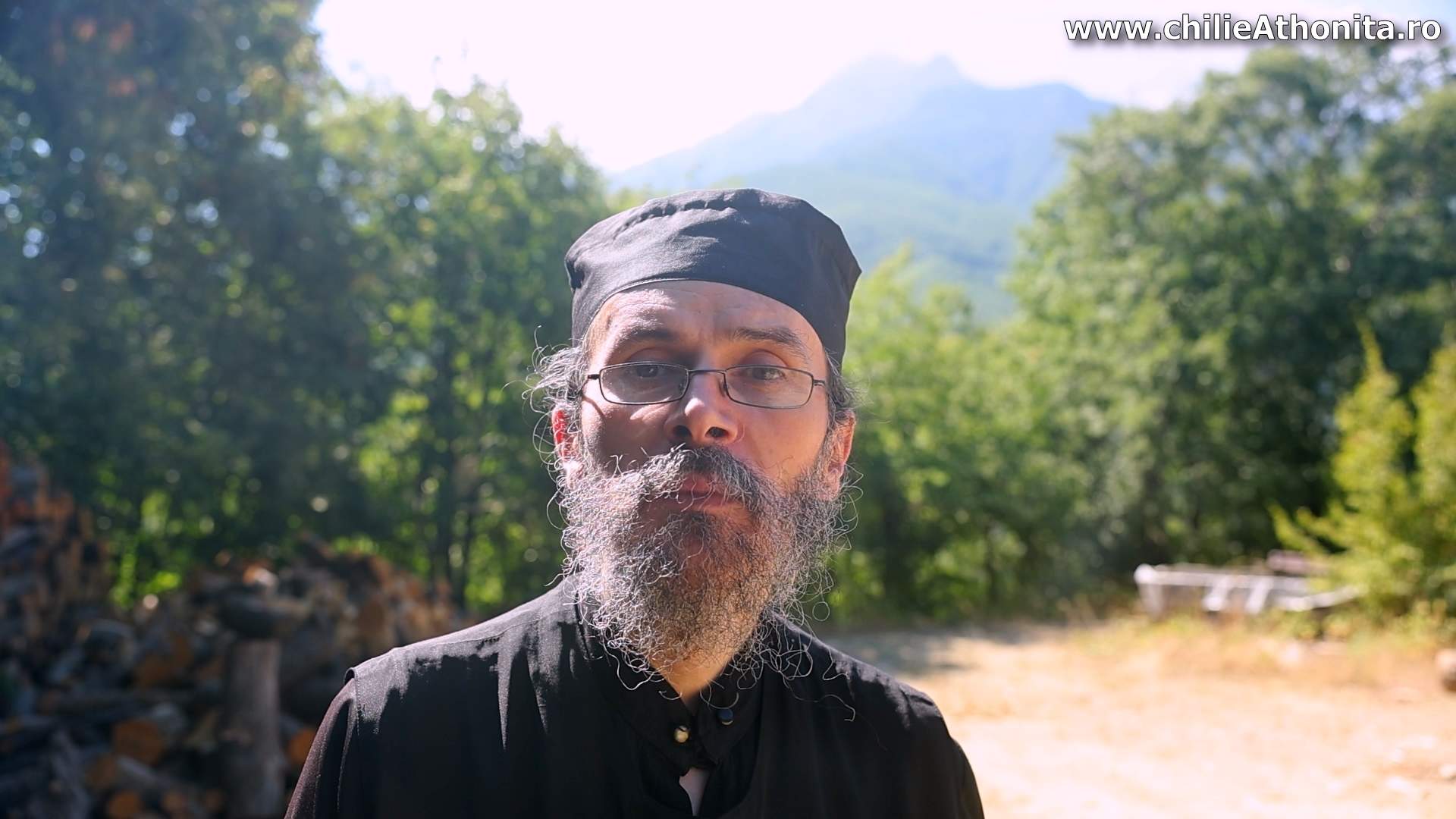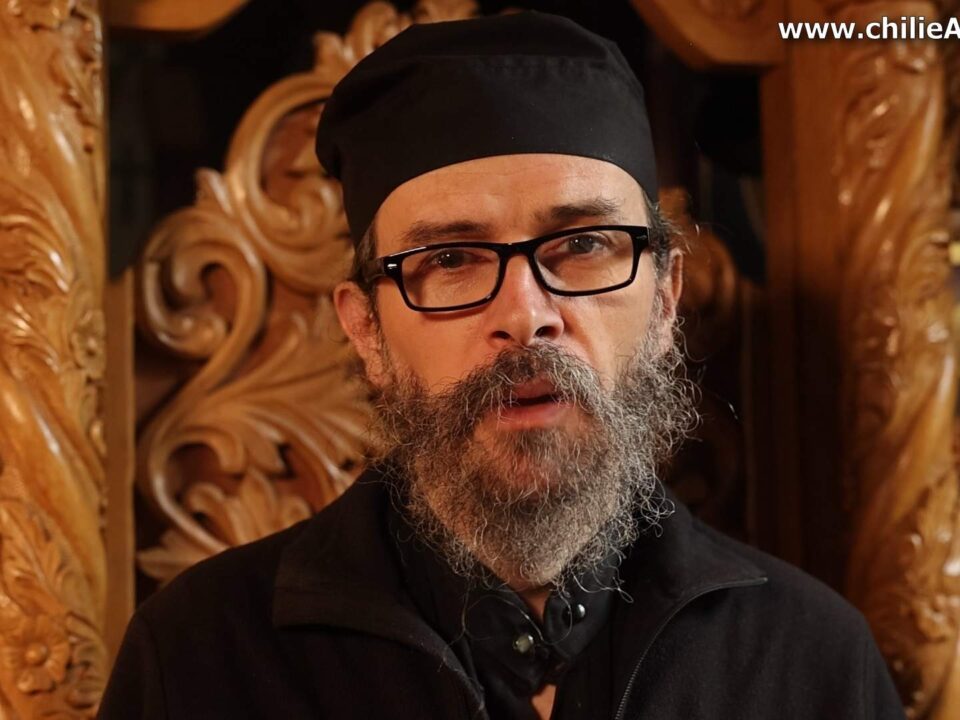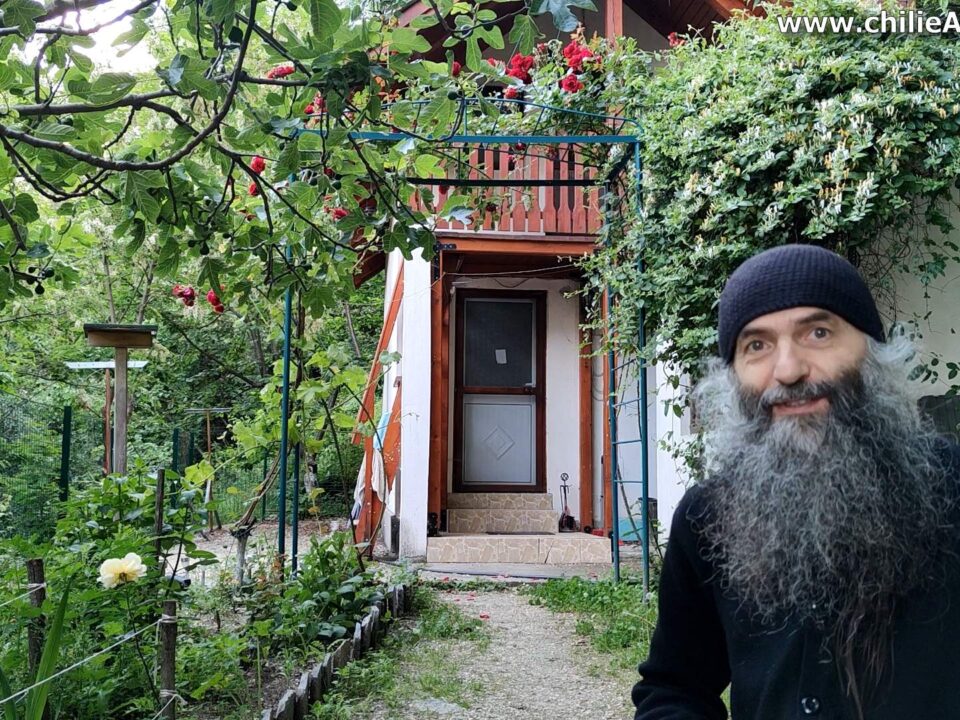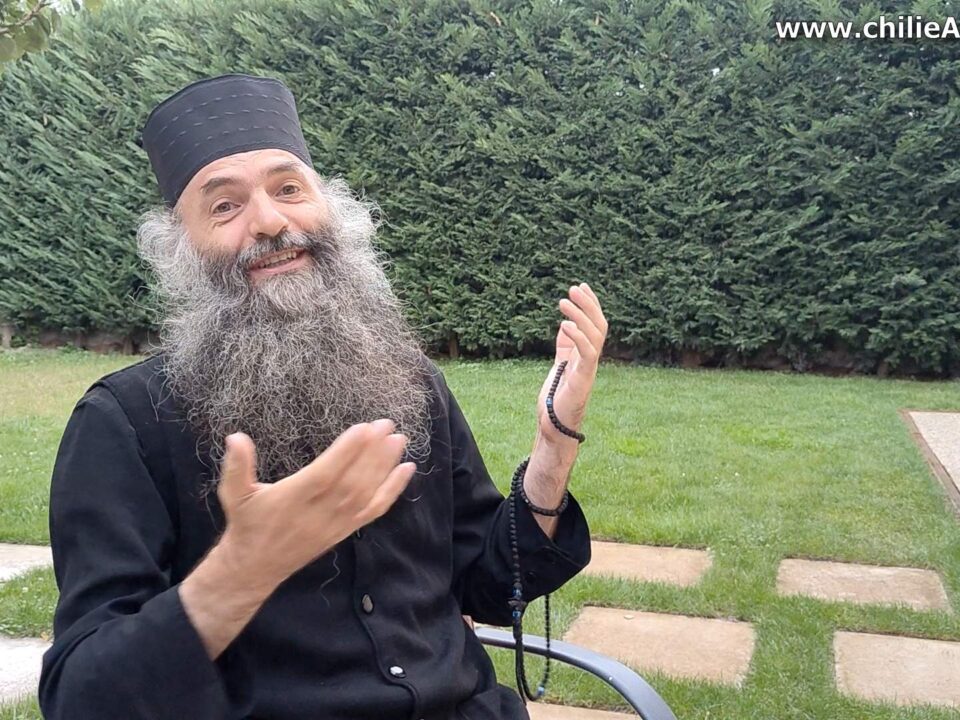
The Mother of God as an Example for Us – Father Theologos
14 August 2022
Hope in God – Father Pimen Vlad
19 August 2022We continue the series on obedience, analyzing one of the great issues related to it and, by extension, to human existence: interpersonal relationships.
Watch this video to find out what the position of the Holy Fathers is regarding relationships between us within the framework of obedience.
Enjoy!
Glory to the Father, and to the Son, and to the Holy Spirit, and now and ever and unto the ages and ages. Amen
Through the prayers of our holy fathers, Lord Jesus Christ, Son of God, have mercy on us! Amen!
We talked about how to obey, the temptations that are there and other aspects of it, all of which are seen mainly from the disciple’s point of view.
Then we talked a little bit about the relationship with one’s leader – whether spiritual, professional and even political, and I insisted on certain aspects in the case of this vertical relationship.
Today we’re going to continue this itinerary, this listening analysis, and we’re going to see it rather from the perspective of human relationships, from a rather social perspective.
As I have said so many times, heaven is the complete communion in God, the loving unity with God and through God with others, and hell is eternal loneliness. Because of this, as the Holy Fathers say that – according to God – hell and heaven depend on our neighbor. That is how we relate to our neighbor, to our brothers, to the other.
You need to know that the devil’s main war will be to break any of your relationship through which God’s grace comes to you. That’s the main war. That is, to spoil our relationships with others and mainly with the institution of grace, with the one through whom grace comes. If you have heard someone – especially a so-called spiritual man, yes, a monk, I could say – who says that he has not had war against his spiritual leader, that man either is holy, either does not know what is happening to him – that is, he does not have the guard of his mind – or I’m sorry, he’s lying to you in your face. There is no other way, brethren, I can’t see any other.
Here we must be very careful and not receive these thoughts. Of course, however, that this process depends on the spiritual measure of the disciple, on his love for his leader, on his faith in God and through him, on the one that God has put before him, but of course it also depends on the latter, that is, on the leader. Do you understand?
Now, if the community is small – for example, a family, a small chapel, a small parish, a small business – things are simpler. But if the area is larger – that is, a large monastery, a parish with many people, a multinational company, a city – in the case of the mayor, the county and even in the case of political leaders at a county or national level, then things become much more complex and the leader must know very well that he is in the fog on a minefield. That he doesn’t know who he’s dealing with.
That’s why St. John of the Ladder says that a leader should not have the gift – so to speak – of working miracles or the gift of healings, but the gift of clairvoyance – at least – and the gift of discernment, that is, the gift of telling things apart. All these gifts come directly from God, through a strict humility, brethren – humility that is based on prior obedience. That is, brethren, a successful parent is one who was an obedient child, a confessor, a successful abbot was the one who was an obedient disciple, a good, successful director is the one who started from the bottom and was obedient. I mean, he basically knows what’s going on because he’s learned from others before him – I think that’s natural, brethren, right?
Look at all the big firms and all the charismatic, capable executives, all the successful executives. Okay, now of course I don’t validate them spiritually – but they succeeded professionally because they were listeners, of course; professionally, they started from the bottom. So it happens politically and socially too: a political leader cannot be successful if he was not previously a successful citizen who apprenticed with other diplomats, beside other successful politicians to whom he obeyed and from who he learned the trade. Do you understand?
From this experience of obedience on different levels, as I was talking about, man gets this humility – basic humility, brethren, please understand, that is, I do not speak of the high measures of the humility of the Holy Fathers. Now, they get humility and discernment in that field.
Now we have to be a little careful here; if someone gets for his obedience the gift of discernment of spirits on this professional plane – that is, for example, if someone has apprenticed on computer science, which I have known a little, as a junior programmer besides great programmers and software architects and, therefore, he gets from God the enlightenment to know what software architectures must be implemented in different situations or, and more importantly, whether a culture of software company is toxic or not, whether it’s successful or not – that doesn’t mean that he knows how to solve his spiritual problems, his existential problems, his life problems. Or, even more seriously, it is likely that he does not know how to solve the problems of others. Do you understand?
Now you’re going to tell me that this is obvious. Yes, it is obvious, but it is sometimes seen that we get into spiritual problems and we impose our opinion – sometimes even without realizing it: we teach others and we even get one’s spiritual father, when it comes to spiritual matters, to the matters of the Church. And here I do not allude to programmers so much. I’m just talking about them because it’s an area where, well, with the gift of God, I’ve had some experience in my life.
But I speak in general, that is, the people who are in a parish because they believe themselves – it may also be true – to be entrepreneurs, successful businessmen, they think they can also fulfill spiritual matters as well. Brethren, it’s not quite like that, you know?
Now you should know that on the contrary, in the case of top programmers, the exact opposite happens: a top programmer is the one who realizes how small the distance between his ears is, brethren. How small is the distance between the ears, how powerless it is in the face of complexities, in software and especially in the face of human problems. And that’s because any IT problem is human at its core. Keep that in mind!
Yes… Because there were big dramas on this plane. They tried to solve IT problems, thinking they were software problems – sure, they are, but mainly, they did not solve human problems and because of this they collapsed, forbid the good God!
Even I, as a monk, have received many indications from those who have no ties to the monastic life, have not stayed in the monastery as a brother, but only rely on the creed of their mind. That’s because today’s civilization pushes us towards affirming our own opinion, firmly holding our position based on what we have read or heard on the Internet and not on personal experience. Once again – the belief in your own mind, right? I read that I do not know what anonymous user on the Internet said I do not know what and some other guy with 20 years of experience in the profession does not know, I know that I read on the Internet. Brethren, that’s not right! Do you understand?
Of course, there is also the reverse side of things, which is a little subtler, sometimes: a specialist in spirituality, that is, a spiritual father, should not necessarily be asked professional or social matters. Do you understand? The confessor does not know them all, but he knows more or less the spiritual ones and therefore in these matters he must be listened to. Do you understand?
Now, if you ask me about computer science or, well, about photography and filming and equipment, sure, I could give you an opinion, but it does not mean that I am an authority in the field and that you are bound before the spiritual law to listen to the computer science solution that I give you. Now, if you listen to what I say, like this, with my experience in the field, very well, if not, you are free. So brethren, it does not mean that if someone knows spirituality – well, I do not know spirituality, but certain spiritual fathers are considered as gurus and are asked all kinds of things. Brethren, that’s not right!
The confessor is a counselor in matters of sin and that’s all!
Brethren, we are all limited and there’s nothing uglier than someone who thinks he knows them all. Even in Greek there is a term – “xerolas” – meaning “the all-knowing”, but it’s in an ironic way, because, as the Holy Fathers say: theoretical, intellectual knowledge without the practical one is the surest way to heresy.
Heresy can also be a heresy, error – so the word error comes from the Greek “eresi”, heresy – professional error can be professional heresy, but – God forbid! – it can also be a dogmatic one. Our soul is at stake, brethren! Do you understand? we lose our salvation on the basis of self-confidence. We are confident and we fall very easily into deception, into error. Because of this in the Romanian language there is a very beautiful word, I really like this word that describes the one who is confident, the one who trusts himself – it is about the word “înfumurat”. It means in the smoke, brethren. The one trusting his thought is in smoke, he is haughty. Do you understand?
If this is ugly in the case of a ruler, the more it is undesirable in the case of a disciple, brethren. Do you understand?
Okay, now we’ve settled that no one knows it all — so I’m addressing the disciples in particular because they’re in danger, they don’t know — right? – and they want to learn. Disciples, you must remember the victories of your spiritual leader, so as to counterbalance the attacks of the enemy who wants to separate you from your leader. As I said before, this is the main target of the enemy.
So, always, when you have a teacher or a leader or your parents, remember the beautiful moments you spent with them and not when they were wrong – don’t dwell on that, it’s not good, don’t leave!
Don’t break apart! In strengthening this relationship, you should know that the openness, the communication towards our leader helps a lot. Of course, when we talk about perfect communication, it has the character of a confession – that is, an openness of the disciple to the leader in the themes in which he leads, in which he teaches the disciple, in the themes in which he teaches them from his experience.
That is, for example, of course, to the spiritual father we confess on the spiritual level, but at the hierarchical head, as I said, at the software architect, at the project manager, we confess on a professional level. I mean, we say: forgive me, Mr. Whoever, I think this architecture isn’t good, this solution isn’t good or maybe it would be better that way, I have these problems. Do you understand? It is very important.
And to parents, especially to parents. Young folks, don’t somehow close yourself in front of your parents! Talk to your parents, talk to them and, again, I turn to the parents: do not behave in such a way as to make younger people close themselves to you, so you cut your connection to them! Don’t be attackers more than necessary, don’t pressure more than necessary, that doesn’t do much good, because if the bond breaks, you’ll have to do much hard work to restore it. Do you understand?
Because of this, it is necessary for there to be a loving relationship between the leader and those that are led – a relationship that, of course, is easier to achieve when, as I said, the leader has a community, a smaller family to manage. A family, right?
Be careful when we say a family, considering the family from a young age and we say a large family… the large family is… how many children? So it’s all a little community, brethren. It cannot be compared – obviously – with a parish, for example, or with a country. Because of this, the family is the basic cell of society. Do you understand?
And on the other plane of monasticism is the small community. Now, regarding the small community, St. John of the Ladder say: it is the best, the problem with the small communities today is that there are not so many abbots, not so many spiritual leaders to lead them. Do you understand? Because of that. But know that the good God helps! The good God takes care of it!
So always, like I said, there must be little cells, these nests of spirituality, families in the world and in monasticism. Of course, because as I said, in monasticism we do not have very many spiritual abbots, and, because of this, communities are large.
And to give you an example of the success of a confession in a small community, we have the famous community of Gheron Joseph, of St. Joseph the Hesychast, where he was very loving, in the evening, and confessed his disciples every day. Every day.
This allowed him throughout the day to humble the brothers and cut off their will, because he knew how much each could carry. He could raise his voice to them and so on, the disciples knew that the Elder, that St. Joseph the Hesychast loved them. Do you understand? And they didn’t break away from him, because they knew that all these things on the one hand humbled them and on the other hand helped them move forward, work together, collaborate. Do you understand? They were one.
I have experienced this, of course, with my confessor, God bless him! Father Theona, like that, with whom I really were very close, kept humiliating me and telling me and I felt his love, I felt his love. Do you understand? That helped me a lot.
Whereas if someone is far away, he can have any other position, he is still not validated by the grace of the Holy Spirit. Do you understand?
This is how someone is perfected – when he is close to the leader to confess and obeys.
On the other hand, the extraordinary performance of Saint Athanasius the Athonite who is considered the patriarch of Athonite monasticism is not his asceticism or, I don’t know, his teachings, his writings. Saint Athanasius did not write anything, we were not left with anything, with any extraordinary work from him. And regarding his asceticism, yes, he did asceticism, of course, but it is not distinguishable. There were parents from the Holy Mountain who made asceticism much greater than Saint Athanasius the Athonite.
The extraordinary performance of Saint Athanasius the Athonite was that having a community of 120 monks with whom he would do confession daily. Daily!
It is very likely that Saint Athanasius was also confessing through messages, that is… well no, not on WhatsApp, brethren, Telegram or Skype or God knows what, but on the paper notes, a practice that St. John of the Ladder also mentions. Do you understand?
It is very important that the disciple is completely open to his Elder!
Of course, we say that openness, and not confession, is important in the purely ecclesial, classic sense of the word. Because in fact, both Gheron Joseph and St. Athanasius the Athonite were not priests, they were mere monks. Do you understand?
Now, when this daily confession is not possible, for example, in a larger community, in a larger parish, in an enterprise so to speak, then things change and each of those involved must humble themselves. On the one hand, the leader must know his limits and not pressure those he leads as he may not realize how he may be perceived, and, on the other hand, those who are led must be patient – to the point of sin-related problems, of course. And of course, there has to be good communication. Now that we have emails, we have all these programs, use mail, use WhatsApp or whatever programs you have today to send a message when appropriate. Do you understand? Don’t get lonely!
Of course, as I said, we must stop at sin-related problems, but the sin of the leader must be, however, obvious – that is, proven. In general, the Holy Fathers speak of when he may prefer relationships with women over the community, sometimes even closer relationships – I think you know what I mean – or/and – God forbid! – if this leader begins to give away [things from within the community], to do things condemned by that community as obviously wrong. Do you understand?
By community I mean the wider community. On the spiritual level it is when the spiritual leader begins to say heresies condemned in the synod. So not immediately when someone begins thinking “That’s it! My leader, my abbot was wrong! The director was wrong! I’m leaving.” Not like this, brethren! Do you understand? Who easily sprouts and moves from place to place, that one does not bear fruit. No matter how good he can be from a professional point of view or however natural gifts he may have (that is, in the case of monasticism, he may paint beautiful icons) – it does not bear fruit, brethren. It doesn’t bear fruit, you understand?
It used to be a great shame for someone – even in the world – to divorce. It was unthinkable, today it’s fashionable. Or in the old days it was a shame for someone to change their job, it was a minus. Today… [that happens] every five minutes. Brethren, it’s not good! Is it, do you understand?
And because we have come here, to the real, exaggerated or even imaginary sins of the leaders, as it seems to us in the case of the disciples, a proof of the love, of the openness that I was talking about, is mentioning with humility – once again I repeat myself: with humility! – of things that bother them, that they carry with more difficulty. We are not attackers. The ruler is good to solve these, if they are founded, of course, and especially if the disciples are not bound with the golden chain of love, as St. John of the Ladder says. Because if these inner tensions of the disciples are not resolved, at some point they will explode and the explosion will be large.
But if a disciple loves God and people, then he can have great achievements both spiritually and socially and professionally. Yes, and he can be humble and he can be given by example.
We read in the lives of the saints, at the Holy Fathers what obediences, what humiliations some of them went through – I remember now one of many cases that St. John of the Ladder mentions, in which the abbot humbles a thief who wanted to become a monk to confess publicly. This was done by the abbot in question, as St. John notes, to humble the devil, to cleanse the man of the many sins that the thief had, as he was the most evil of all, brethren, and to be an example to those in the community, because in the community of that abbot there were monks with unconfessed sins. Who had already closed themselves. Do you understand? It’s very dangerous, brethren!
Okay, but the abbot could not have done this if he had not known the man in question who had just confessed in private and so the abbot knew that he would be able to bear it.
But we – who do not know if our brothers will bear what comes upon them – should be careful above all not to hurt the conscience of our fellow brothers. Bullying is not good, brethren! Attacking others is not good. Let’s not forget that the moment we hurt someone we will pay for it, brethren, or through our own repentance – glory to God, it would be very good! – or, if not, by humility, pain derived from the spiritual law. Anyway it will come back around, brethren, do not think that you can escape!
When we hurt someone, when we sin, we feel pleasure, a devilish satisfaction that will pay off, as I said. The moment someone is bullying, that person feels satisfied, forbid the good God! And they’re going to pay to restore the spiritual balance. There are many sins in relationships with others that pay off. Do you understand?
I recall here only two of the other extreme of the attacking sins, of the aggressive sins I have spoken of, of the bitter sins that hurt the brothers frontally through a brazen, uncivil behavior, let’s say. The other sins in the other extreme are the so-called “sweet sins” that are against bitter sins, but they are still sins. These sins present themselves beautifully. It’s about boldness and vain glory. Let us not have boldness against our brothers, because boldness is sister to naughtiness and very easily it is possible to harm, again, ourselves and our brothers. So bullying alsocomes because of that, because we have boldness, right? And again it comes down to injury and again we’re going to pay for it, both ourselves and those who validate us.
A third large category of sins relating [our relationship] to [our] brothers, which stand in the middle between bitter sins and sweet sins are sins related to indifference to brothers. That is, someone needs help, he struggles and you don’t care, that is: “eh, it’s all good…” Or, what’s more, you even put pressure it: “When do you finish? Not finished? What are you doing there?” Do you understand? Great problems. And sometimes you even laugh a bit. Well, it will come back around some time. This pleasure is going to be come out through a pain, through an analogous humiliation.
On the other hand, brethren, let us not refuse humility, pains on the grounds that we can’t bear them. Brethren, for us they are. Brethren, we must rise to the level of God’s will, and not God’s will should not have to come down to our level. We have to bear those that are ours. Do you understand? To pay back our sins. We are of hell, brothers. Since God allows something, He knows very well why He allows it, and with temptation, He gives humility and the way out.
Because of this let us be patient, let us have prayer and the simplicity of hope in our obedience. Prayer is needed because prayer is the mind talking to God and so we find out what God wants from us in the temptation we are going through.
Let us not do it according to our heads because those who do according to their heads without asking and without listening, without having patience and without having hope that the good God will help, get entangled much worse in the threads of temptations and from there they do not come out, brethren.
May the good God to protect us and help us!
Through the prayers of our holy fathers, Lord Jesus Christ, Son of God, have mercy on us! Amen
Pomelnice online și donații
Doamne ajută!
Dacă aveți un card și doriți să trimiteți pomelnice online și donații folosind cardul dumneavoastră, sau/și să susțineți activitatea noastră filantropică, inclusiv acest site, vă rugăm să introduceți datele necesare mai jos pentru a face o mică donație. Forma este sigură – procesatorul de carduri este Stripe – leader mondial în acest domeniu. Nu colectăm datele dvs. personale.
Dacă nu aveți card sau nu doriți să-l folosiți, accesați Pagina de donații și Pomelnice online .
Ne rugăm pentru cei dragi ai dumneavoastră! (vă rugăm nu introduceți detalii neesențiale precum dorințe, grade de rudenie, introduceri etc. Treceți DOAR numele!)
Mai ales pentru pomelnicele recurente, vă rugăm să păstrați pomelnicele sub 20 de nume. Dacă puneți un membru al familiei, noi adăugăm „și familiile lor”.
Dumnezeu să vă răsplătească dragostea!








